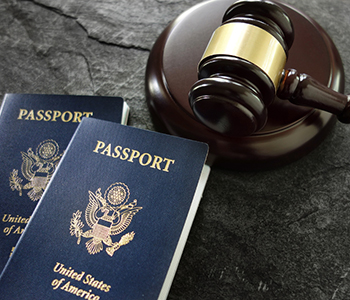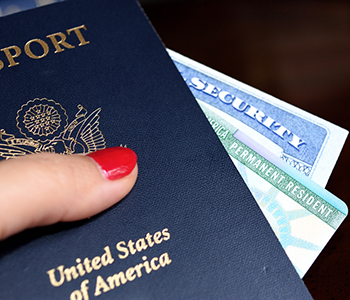More Citizens


Southern California Immigration Lawyer
Romben Law is an immigration law firm with offices in West Covina, California, and in Palm Springs, California. We are committed to serving Los Angeles, the San Gabriel Valley, and Riverside County communities, as well as immigrants all over the world. We are a small firm devoted exclusively to immigration and nationality issues. We take great pride in counseling and working with non-traditional families and same-sex couples. Our clients come from throughout the U.S. and from countries on six continents. We are available for consultations in our offices, or by televideo. Our attorney looks forward to hearing from you.
Immigration Law
The primary law that governs immigration policy is the Immigration and Nationality Act (INA). Under the INA, the United States can grant at most 675,000 permanent immigrant visas across various visa categories. However, there is no restriction on the yearly admission of citizens’ spouses, parents, or children under age 21. Each year, the President can determine the annual number of refugees to be admitted to the country through the United States Refugee Resettlement Process. After an immigrant visa is obtained, and a person comes into the country, they become a lawful permanent resident. Sometimes this status also is obtained through adjustment of status by non-citizens already within the country’s borders. Each year, our country also admits foreign nationals on a temporary basis for a range of reasons, including tourism and education. The immigration attorney at our Los Angeles firm can help you determine which visa may be best for you.
Deportation and Removal Defense
If you do not have legal status in the U.S., and you are in removal proceedings, there are various legal defenses that may be appropriate to raise to avoid being deported. One potential defense is to show that the government should not have placed you in removal proceedings because the Department of Homeland Security has charged you for the wrong reasons or does not have sufficient documentation to prove that you can be removed. Other types of relief from removal that may be available include adjustment of status, withholding of removal, asylum, protection under the Convention Against Torture, cancellation of removal, relief under the Violence Against Women Act, deferred action, voluntary departure, and prosecutorial discretion. Each of these applies to very specific circumstances. For example, asylum is a type of protection for refugees who are fleeing persecution in their home country.
Immigration Appeals
If you get an adverse decision from a government office or official in your immigration case, you should consult our experienced Los Angeles immigration attorney because you may be able to appeal. There are multiple appellate levels. The first is the Board of Immigration Appeals (BIA), which is the highest administrative body for interpreting and applying immigration laws. If you receive an adverse decision before the BIA, you may be able to appeal to the Federal Circuit Court of Appeals, which reviews removal orders based on constitutional or legal grounds, illegal confinement of someone in immigration custody, USCIS denial of an application for naturalization, and other matters. If USCIS makes an adverse decision, you may be able to appeal it to the Administrative Appeals Office. We can help you analyze your situation and determine whether you may have a strong basis for an appeal.
Waivers
If you are not eligible to adjust your status in the U.S., you will need to go abroad to get an immigrant visa. Fortunately, certain immigrant visa applicants who are immediate relatives of U.S. citizens can apply for provisional unlawful presence waivers before leaving to go abroad to go through the immigrant visa interview abroad. The waiver process was expanded to include anyone who is statutorily eligible to get an immigrant visa. People who are statutorily eligible are immediate relatives, Diversity Visa selectees, family-sponsored immigrants, and employment-based immigrants. You can apply for a waiver of inadmissibility before departing for the immigrant visa interview abroad if you are statutorily eligible for an immigrant visa.
Family Immigration
One significant principle in U.S. immigration law is family unification. Citizens and lawful permanent residents can bring certain members of their family to the U.S. Our Los Angeles immigration lawyer takes pride in assisting families with this process. They can be admitted as immediate relatives through meeting certain standard eligibility criteria or through the family preference system. Immediate relatives who can be admitted are spouses of citizens, unmarried minor children of citizens, and parents of citizens. There are a restricted number of visas available through the family preference system if you meet the criteria. For example, there is a preference for adult children, whether married or unmarried, and spouses and unmarried children of lawful permanent residents.
Citizenship and Naturalization
If you are a citizen of the U.S., you can travel with a U.S. passport, vote in federal elections, and petition to bring your relatives to the U.S. You also will no longer be subject to immigration laws that could put you at risk of removal from the U.S. USCIS will examine your immigration history if you apply for naturalization. There are different paths to citizenship. For example, a lawful permanent resident can apply for naturalization after five years, or three years in some cases. They must establish good moral character and physical presence in the U.S., as well as passing tests to demonstrate their knowledge of the English language and democratic principles.
Retain an Experienced Immigration Lawyer in the Los Angeles Area
If you need to come to the U.S., fight back against a threat of removal from the U.S., or bring a family member or employee to the U.S., you should consult an experienced attorney. Romben Law is an immigration law firm with offices in West Covina and Palm Springs. We represent people throughout Los Angeles, Orange, Riverside, San Bernardino, and San Diego Counties. Call us at (626) 577-8020 or contact us via our online form to find out more about how we can assist you.

Meet Romben Aquino
I have been doing immigration exclusively since 2005. I stumbled into my first immigration job as a result of a number of happy coincidences. A friend of mine forwarded me a job listing that she received from her law school classmate, who was trying to help out alums of his law school.Client Reviews
My wife and I were very, very fortunate to have Mr. Aquino handling her complicated and challenging immigration case. His formidable knowledge of immigration law and the...
I met Romben at a law office in New York where my husband was submitting his Naturalization papers. It was 5 months after my husband and I got married and 1 month after...
I was applying for permanent resident status, and Romben did a great job of explaining our options, the process and what to expect, and even went with us to our...
Our Offices

Palm Springs, CA 92262

Newsletter

Get in Touch
- 1 Understand What Dangers To Avoid
- 2 Be As Stress-Free as Possible Through the Process
- 3 Let Us Be Your Sherpas on the Journey




